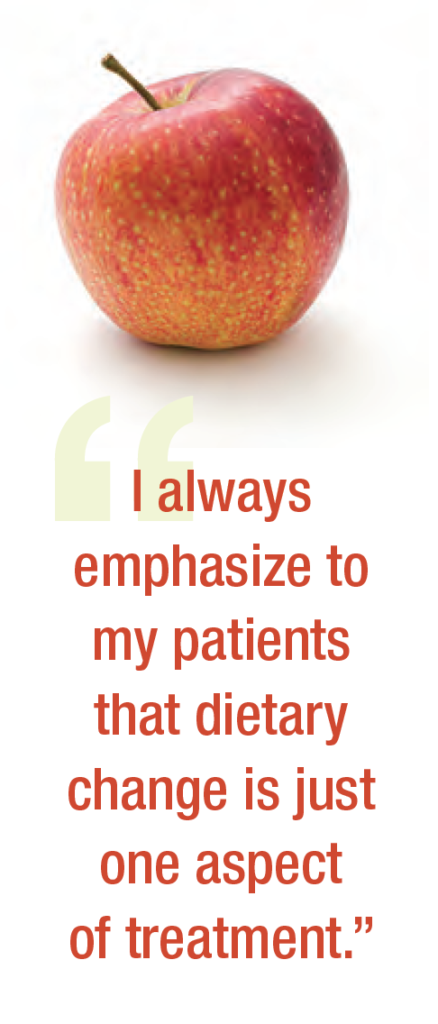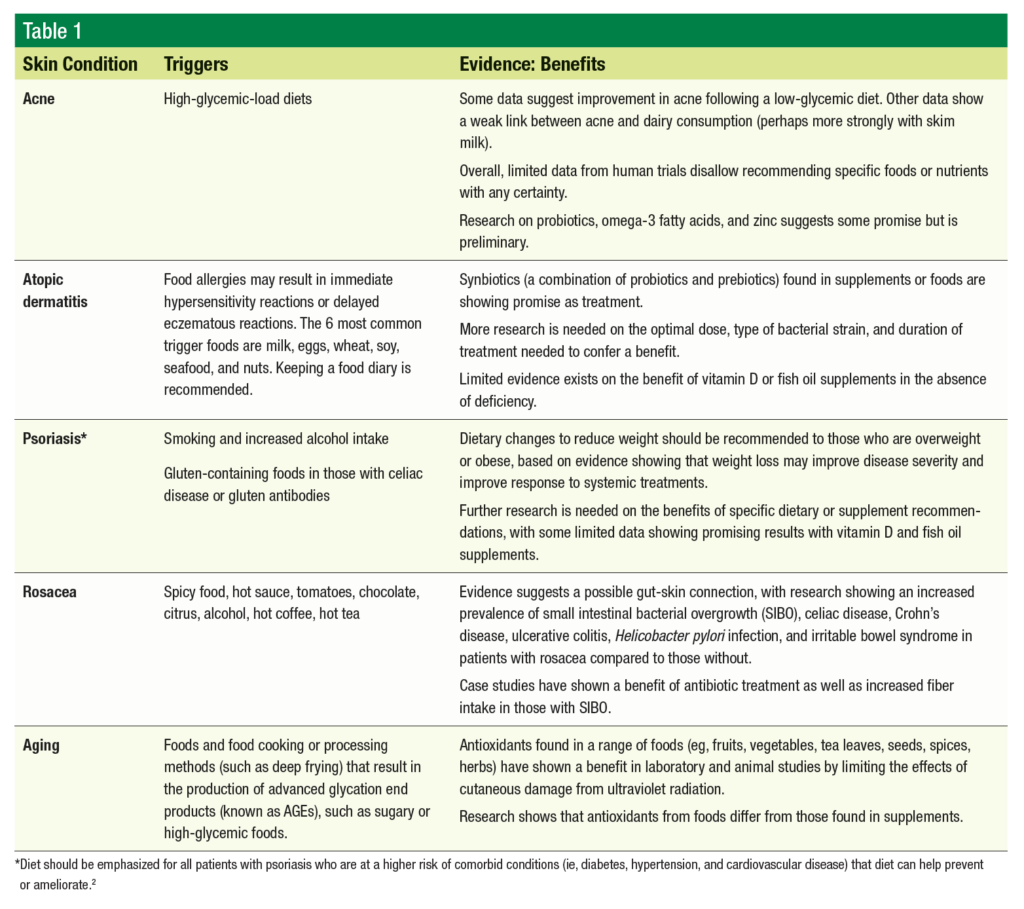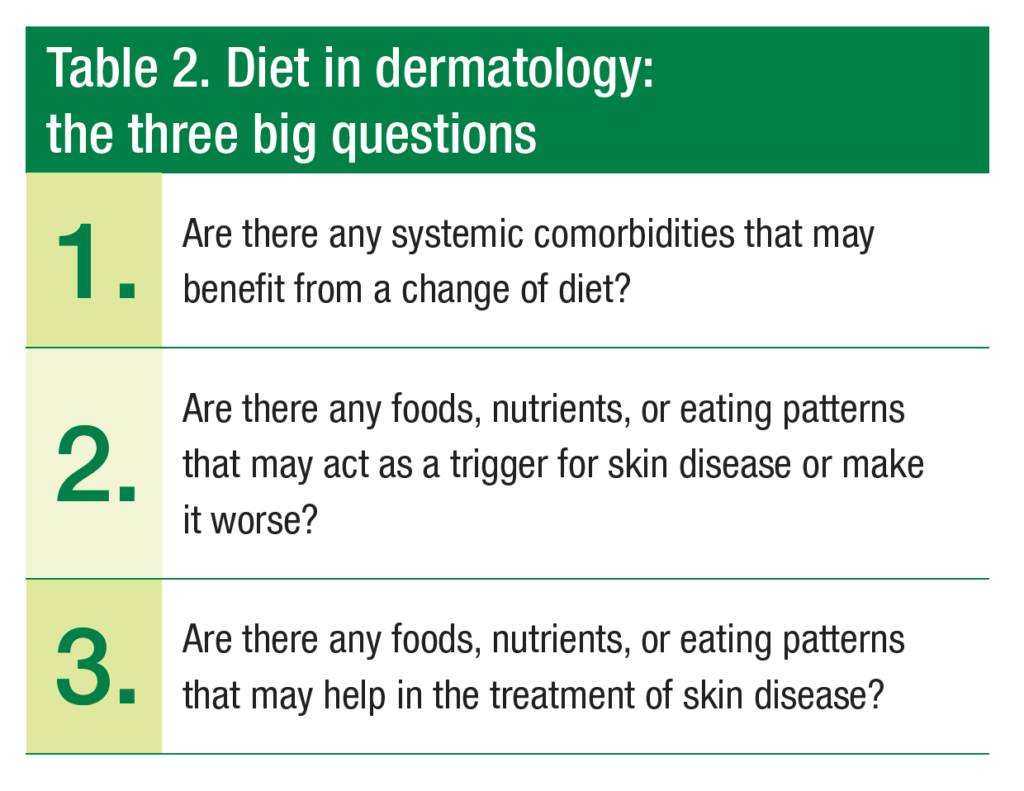By Mary Beth Nierengarten; Reviewed by Rajani Katta, MD

The idea that diet can and does affect the skin is not new. Dermatologists have long known that vitamin deficiencies may cause a number of skin conditions.1 What is relatively new is the growing evidence on the extent to which diet can affect skin, both as a trigger for exacerbating conditions such as acne and atopic dermatitis as well as a means to help ease these and other conditions.
Rajani Katta, MD, a dermatologist on the clinical faculty at the Baylor College of Medicine and the McGovern Medical School, Houston, who has written extensively on this topic, emphasized that dermatologists should know the evidence on how diet affects skin to help guide patients as well as to dispel common myths and misconceptions about this association. (For more information, see Dr. Katta’s site: https://www.doctorkatta.com/diet-skin.)
“In the past, dermatologists would refer patients to primary care doctors or nutritionists with questions about diet,” she said. “I don’t think that is good enough anymore because of the massive amount of information on the internet about this, much of it misleading or biased, along with the lack of evidence, particularly with certain supplements, that patients need to be aware of.”

While Dr. Katta strongly urges dermatologists to talk to patients about the evidence or lack of evidence on the link between diet and certain skin conditions, she underscores that patients need to understand that diet is just one component of skin health. “I always emphasize to my patients that dietary change is just one aspect of treatment,” she said. “It may be a part of the treatment plan, but typically diet does not replace other medical therapies.”
Emphasizing that much is still unknown about diet and dermatology, Jeremy Hugh, MD, Assistant Professor and Co-Director of Medical Education, University of Colorado Department of Dermatology, Aurora, also cautioned that diet is only a small component of skin care. “I’m okay with patients trying to alter their diet in order to improve their skin if it doesn’t hurt them,” he said. “However, I do emphasize that this alone is unlikely to improve their skin in many cases.”
He does believe that much of the connection between diet and dermatology just can’t yet be proven. So what is currently known?
Current evidence
In a 2019 review article on skin and diet, Dr. Katta and a colleague provide information on 5 major skin conditions for which there is ongoing research and some evidence that diet plays a treatment role.2 The article lays out the evidence in terms of what foods, nutrients, or dietary habits may act as triggers for specific skin conditions and the utility of avoiding or eliminating those foods from a patient’s diet, as well as evidence on foods, nutrients, or dietary habits that may help to treat specific skin conditions. Table 1 synthesizes this information.

Dr. Katta underscored that there are other areas in which diet may also play a role in skin care, including skin cancer prevention, and highlighted recent evidence showing the potential benefit of nicotinamide (vitamin B3) supplementation on reducing the risk of non-melanoma skin cancer in people at high risk for it.3
Dr. Hugh also expressed interest in nicotinamide. “There are limited data to suggest it can reduce new skin cancers, and it’s something we’ve used in conjunction with other medications to treat things like blistering skin disorders,” he said, “so hopefully it has a meaningful role.”
Other supplements under investigation that Dr. Katta thinks hold promise include zinc for acne and synbiotics for atopic dermatitis.4
She emphasized, however, that as a rule of thumb she encourages patients to get their nutrients from whole foods. “Eat power,” she says, referring to foods rich in powerful nutrients. “It is better to get nutrients from whole foods versus supplements because there is so much more synergy and nutrients in whole foods,” she said, saying that the role of supplements is to correct deficiencies. “Beyond that, you really need more research before we can recommend supplements,” she said.
Using the evidence in clinical practice
Dr. Katta uses a framework to break down the role of diet in dermatology into 3 main areas (Table 2).

When Dr. Katta thinks diet may be playing a role in a patient’s skin condition, she considers the evidence (such as provided in Table 1) on the dietary benefits, but emphasized again that including diet in the treatment plan is only 1 component and should not be considered the main focus.
She said that she often tells her patients about the 2 main myths about skin and diet. One is that diet has no impact on the skin, and the other is that diet is the cause of all skin problems. “I see people at both extremes, and so I talk about diet as only one aspect, trigger or helper, when approaching a patient with skin disease,” she said.
Among the most common misconceptions about diet and skin is the broadly held belief that dairy or gluten allergies are the main culprits. “We need to educate people that some people may be allergic to those foods, but most people with skin disease are not reacting to those foods,” she said. “We have to think about this systematically and customize our approach for the particular skin condition and particular medical profile of each patient.”
Click to listen to a podcast interview with Jonette Keri, MD, PhD, on original research on chocolate/sugar/glycemic diet in acne at www.thedermdigest.com/keri_podcast
Although more evidence is emerging on the many ways that diet can influence skin, Dr. Katta underscored that the data are too limited to yet provide definitive recommendations on the exact role of diet. Rather, the benefits suggested in Table 1 can be considered general recommendations that may be helpful within a more broad treatment approach.
Dr. Hugh said that he typically counsels patients on diet if he thinks it has a meaningful role in their condition. “For instance, in those with a higher body mass index at baseline, weight loss (more in the form of calorie restriction rather than a specific diet) may improve things such as psoriasis and hidradenitis suppurativa.”
However, he cautions patients about the limitations of what diet can achieve. “When patients ask how diet may affect their skin with things such as eczema, where the data are very weak, I tell them they are welcome to adjust [their diet] as they please, but that I’m not sure it will change their skin dramatically.”
“I think allowing patients to try [diet changes] is important, but knowing the limitations associated with that is even more important,” he said.
Sources
- Basavaraj KH, Seemanthini C, Rashmi R. Diet in dermatology. Indian J Dermatol. 2010;55:205-210. https://www.ncbi.nlm.nih.gov/pmc/articles/PMC2965901/
- Katta R, Kramer MJ. Skin and diet: an update on the role of dietary change as treatment strategy for skin disease. Skin Therapy Letter. 2018;23:1-5. https://www.skintherapyletter.com/dermatology/diet-change-treatment-skin-disease/
- Chen AC, Martin AJ, Choy B, et al. A phase 3 randomized trial of nicotinamide for skin-cancer chemoprevention. N Eng J Med. 2015;373:1618-1626. https://www.nejm.org/doi/full/10.1056/nejmoa1506197
- Chang YS, Trivedi MK, Jha A, et al. Synbiotics for prevention and treatment of atopic dermatitis. JAMA Pediatr. 2016;170:299. https://pubmed.ncbi.nlm.nih.gov/26810481/


